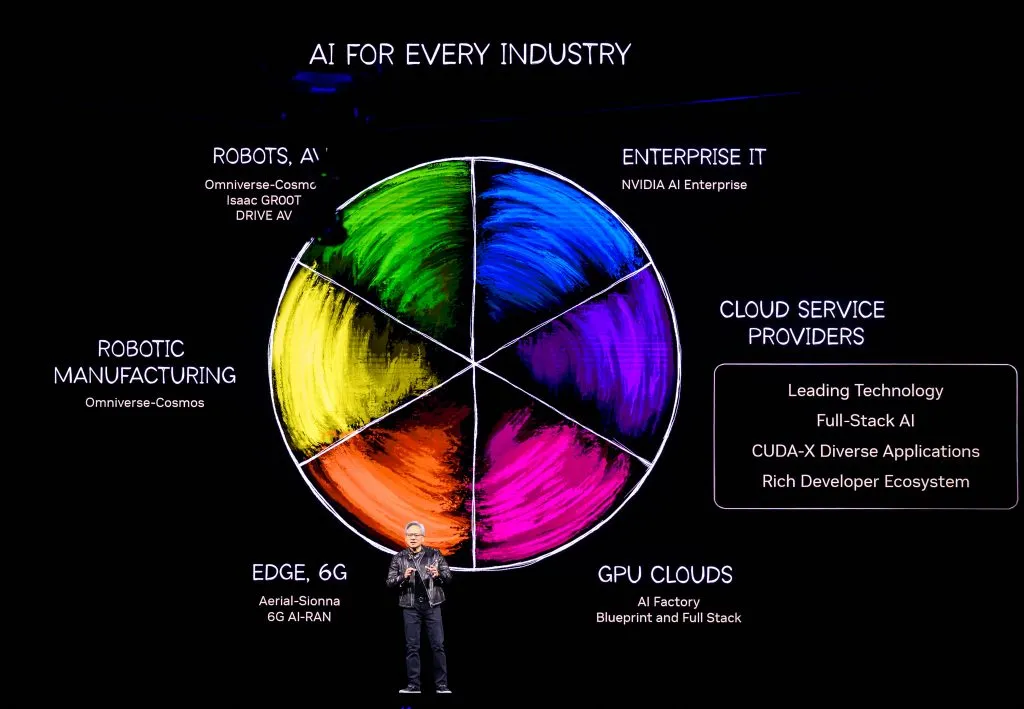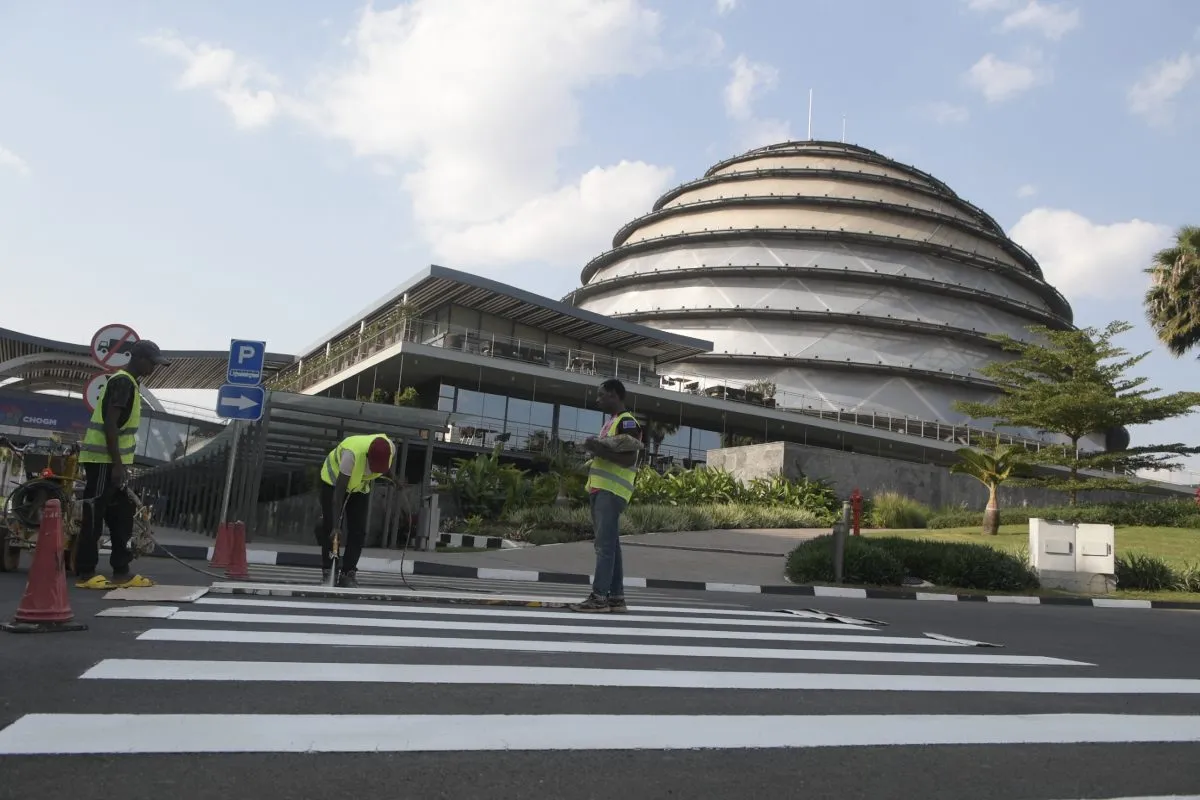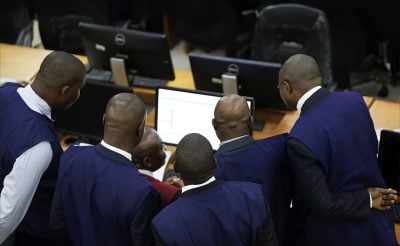From 3-4 April the Rwandan capital Kigali is playing host to a major African summit on artificial intelligence (AI). Hosted by Rwanda’s Centre for the Fourth Industrial Revolution (C4IR) and the Ministry of ICT and Innovation, in collaboration with the World Economic Forum, the Global AI Summit on Africa will gather heads of government, business leaders, investors, and international organisations from across the continent in a bid to make progress on “shaping Africa’s role in the global AI economy”.
The summit comes at a time when policymakers across Africa are increasingly attuned to the transformative potential of this groundbreaking new technology – but are still grappling with how best to maximise this potential while mitigating the risks.
AI applications
The potential value of AI, which works by “training” a complex computer system to recognise patterns in large datasets and make near-instant decisions, is already becoming evident in Africa. In agriculture, for example, AI-powered tools are being deployed to analyse farm conditions such as rainfall and soil health, delivering actionable insights in real time that empower farmers to make the tweaks required to drive up crop yields and earn higher profits.
In healthcare, AI has helped clinicians and policymakers track the spread of infectious diseases across the continent. Prescriptive AI, which analyses previous data and insights in order to recommend specific actions, has been used to provide basic medical information, particularly to Africans living in rural communities with limited access to doctors.
Amal El Fallah Seghrouchini, executive president of the International Centre for Artificial Intelligence of Morocco in Rabat, tells African Business that these kinds of use-cases show how AI “can really solve fundamental problems”. Alexander Tsado, co-founder of the Johannesburg-based activist group Alliance4ai, similarly notes that “AI in Africa can be transformational for hundreds of millions of people.”
African heads of government appear to recognise this potential. Upon assuming the presidency of the G20 in Rio de Janeiro last year, South Africa’s President Cyril Ramaphosa said the country would use the forum to push forward progress on AI in Africa and globally.
At a summit in Zimbabwe in 2023, Rwandan President Paul Kagame argued “it is already possible to see that Africa has the most to gain [from AI]” and added “we should therefore move quickly to embrace AI and make it work for us.”
Unique challenges
At the same time, however, AI also poses unique challenges for the continent – and the regulatory landscape has largely yet to catch up with the breakneck speed of AI innovation. Kennedy Chengeta, an AI-focused academic and entrepreneur based in Pretoria, tells African Business that “while some countries, such as Mauritius, Egypt, and Nigeria have developed national AI strategies, many others have yet to establish comprehensive frameworks.”
Menzi Ndhlovu, a senior political and economic analyst at the Signal Risk consultancy in Cape Town, believes that part of the issue is that “a lot of African governments do not have sufficient knowledge around what AI is – what its capabilities are and the extent of the disruption it could cause, whether that be chaotic disruption or creative disruption.”
“I think the first step before we can even start to try and regulate AI is to know what AI means and what it means for our respective economies,” he adds. “We cannot be predicating an AI strategy based on the experiences of Europe, China, or America. We operate in a very different context and so we need to know what AI means for Africa.”
“There is sometimes a tendency among African governments to regulate first and then understand later. We saw that happening with things like cryptocurrencies, which has impeded some of the potential economic upside that could arise from new innovations. We cannot do that with AI, or we will find ourselves in a bit of a bind.”
Limited response
There have been some moves on the part of national and pan-African authorities to get a grip on AI; but these have so far been limited. In July 2024 in Accra, for example, the African Union launched a Continental Artificial Intelligence Strategy, aimed at bringing forward a development-focused approach to AI.
Mauritius published an AI strategy in 2018; Egypt adopted a national AI strategy in 2021; and in 2023 Benin outlined an AI and big data strategy to promote AI solutions and start working on an AI governance framework. Rwanda, Senegal, and Algeria have also drafted similar national strategies in recent years.
While these are welcome developments, there remains work to be done in translating such strategies into practical policy measures that can help the continent benefit fully from the potential of AI while advancing Africa’s interests. Indeed, the international law firm White & Case has noted that “there are no comprehensive, binding laws or regulations specifically governing AI across the entire African Union.”
On a global level, there have been policy and diplomatic discussions aimed at starting the process of establishing firm regulations governing AI’s use, but these too are also in a nascent stage and inevitably not as focused on Africa-specific issues.
Indeed, in February France’s President Emmanuel Macron hosted the Artificial Intelligence Action Summit in Paris, which revealed a world divided on how best to approach this technology.
Put simply, the Paris summit demonstrated a split between Europe, which is largely concerned with managing the risks created by AI technology; the United States, which is keen to unleash its tech giants to innovate and profit from AI development even further; and China, which aims to advance its own interests and promote its own state-led development model. While African ministers and tech entrepreneurs were at the event in Paris – and the Council of Europe organised a workshop focusing on how Africa can engage in global AI governance – the predominance of these global trends and rivalries underscored the need for a standalone, Africa-specific forum to hammer out the continent’s own approach to policy issues.
African nations ‘must be proactive’
Chengeta notes that, while it is important for Africa’s voice to be heard in global discussions of this kind, it is critical that the continent does not become a “passive adopter” of AI regulations set by others.
“African nations must take a proactive role in global AI fora, not just adopting policies set by other countries but actively contributing to their development,” Chengeta says.
Melody Musoni, a policy and digital governance officer at the ECDPM thinktank in Brussels, has similarly pointed out that Africa “must contribute our own perspectives and own our regulatory frameworks… we want to be standard-makers, not standard-takers.”
April’s Global AI Summit on Africa in Kigali is at least a symbolic sign that Africa aims to do this, representing an opportunity for policymakers to start working out the details on potential national and pan-African regulation that can plug the gaps in existing frameworks and address Africa-specific AI issues.

Data sovereignty
Primary among these is the issue of data sovereignty. AI relies on the use of large datasets, which often include sensitive or personal data. However, pan-African data protection laws are largely weak.
The African Union drafted the “Malabo Convention” on cybersecurity and personal data protection as far back as 2011; but it is not enforceable as it has not been ratified by the required number of member states. Furthermore, limited infrastructure capacity in most African countries means Africa is home to few of the data centres that house this data.
Indeed, it is estimated that the entire continent has just 179 data centres – a quarter of which are in South Africa alone – compared to around 450 in China, 1,200 in Europe, and over 5,000 in the United States.
There is therefore a fear that this gap could allow foreign companies to extract African data from the continent for commercial use in its models, before storing it abroad, offering African governments limited or no ability to oversee how it is used.
While specific details are yet to emerge, there is a growing push on the continent for the enactment of data localisation policies that would force foreign companies to store and process African data within the continent – under the jurisdiction of African governments and regulators. That said, some policymakers are wary of pushing this too far given the need to avoid hampering business with overly burdensome regulation and operational costs.
South Africa has implemented a Protection of Personal Information Act that potentially demonstrates a workable compromise that could be a model for other African nations to follow. While not forcing full data localisation, the law sets out conditions for how data collected in the country can be transferred abroad, including the need for explicit consent from the data subject.
Data has been highlighted as one of the seven “thematic areas” at the upcoming summit in Kigali, underlining its importance to the African discussion around AI.
It remains to be seen what practical steps policymakers will take to bolster the continent’s data sovereignty – and whether the political will is there to do so on a pan-African level.
Unreliable and unrepresentative
Another issue which is important for African policymakers is that of bias in AI models. AI tools are “trained” to make instant decisions based on the datasets they are fed. But information sourced from African countries currently makes up a tiny proportion of the data used in AI models, meaning the systems are often not able to work accurately or fairly in a specifically African context.
Language models using AI have been found to be delivering potentially harmful medical information to Africans or those of African heritage, for example, owing to the fact they have not been trained with a sufficient amount of data related to African individuals.
Tsado tells African Business that these “blind spots” in AI are caused by the fact that not enough Africans are involved in building AI models. “If AI has been built solely from the US, and solely from the most elite institutions in the US, there are going to be huge blind spots. The tools they make will not take into account people who are not in those environments,” he says.
“When it comes to Africa, my message has always been that if you are worrying about the dangers of AI, that does not mean you should run away from it – that is the exact reason you should jump right into it and become builders. That is the way to have influence over the way AI is built – you can provide your inputs that would help reduce harm.”
This raises another question that African governments and policymakers will need to work through: how to ensure the continent has sufficient resources to play a role in global AI development and thereby ensure the technology works for Africa.
To this end, Chengeta believes that it is crucial that “Africa invests in local AI research and development to reduce reliance on foreign technologies, while fostering homegrown expertise to enable the creation
of AI solutions specifically designed to address Africa’s unique challenges and opportunities”.
This is perhaps easier said than done, however, particularly in the current economic climate. Ndhlovu notes that “Africa lacks the capacity to venture into AI given we are still dealing with very basic economic problems. Our priorities are still focused on bread-and-butter issues.”
Basic development first
“Does Africa have the capacity to focus on AI, given the fact we are still dealing with basic things such as having sufficient telephone infrastructure and electric infrastructure? In general, African countries do not have 100% rates of electrification and some do not have universal access to the internet,” he says.
“Before we can start talking about AI and all these grand technical plans, we need to deal with developmental and basic infrastructure problems.”
African policymakers grappling with AI face an unenviable task. The potential of AI to drive up living standards across the continent seems clear; what is less clear is whether African governments currently have the capacity to enact the specific policies that would allow the industry to take hold on the continent in a safe and productive way.
At the moment, Africa represents just 2.5% of the global AI market. To play a stronger role in this emerging industry, it needs more infrastructure – more computing capacity, more skilled workers, and stronger internet coverage – but this will cost money that most African countries do not have.
The Global AI Summit in Kigali demonstrates a commitment on the part of African governments and policymakers to try and forge a new path for the continent amid these challenges. Creative solutions will be required if Africa is to mitigate the risks posed by AI while seizing its potential to transform lives for the better.
Want to continue reading? Subscribe today.
You've read all your free articles for this month! Subscribe now to enjoy full access to our content.
Digital Monthly
£8.00 / month
Receive full unlimited access to our articles, opinions, podcasts and more.
Digital Yearly
£70.00 / year
Our best value offer - save £26 and gain access to all of our digital content for an entire year!

 Sign in with Google
Sign in with Google 



